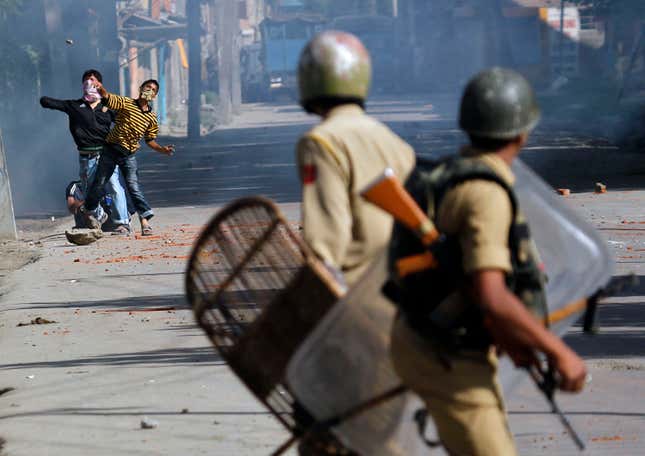SRINAGAR—Masarat Alam Bhat was 19 years old, and a member of the Hizbullah militant group, when he first went to jail in 1990. But it took decades—and multiple incarcerations—before he was finally recognised as a political force in the Kashmir Valley.
The magnitude with which the release of Alam is being discussed across the media and political forums gives an impression that the People’s Democratic Party-led coalition government has let out a person who is apparently a potential threat to national security and the country’s integrity.
However, the brevity of Alam’s political career—and his position in the separatist circles in Kashmir—can be interpreted another way.
An alumnus of Kashmir’s posh missionary school Tyndale Biscoe, Alam was first arrested in 1990 but was released more than a year later, in November 1991. He was detained for a second time in 1993 and kept in custody for more than four years. His custody was prolonged through repeated extensions of detention orders, a petition filed by paternal uncle alleged, and Alam was released only in February 1997.
Alam, according to the petition, was detained for a fourth time in January 2001, and released in August 2003. Two months later, he was detained for the fifth time on October 7, 2003 and held until July 2005.
In all, from 1990 to 2005, Alam was served with as many as nine detention orders and was incarcerated various jails across the state. Sixteen detention orders under the Public Safety Act were issued against him during that period.
Despite many years in detention for his role in the separatist activities, Alam’s position as a leader was still unknown to most of the people in the Valley.
It was only in 2008 that Alam emerged as a significant political force. His role in the anti-government agitation, triggered by the transfer of land to the Amarnath shrine board, pitchforked him into the public eye. Realising his newfound political clout, the authorities detained him once again—and this time for 21 months.
He was released on June 8, 2010. Only three days later, police allegedly killed a teenager from the old city, Tufail Mattoo, after a tear gas canister was shot at him from a close range. The subsequent outcry over the death added momentum to Alam’s political career as his jumped into the protest fray.

Few days after Matoo’s death, Alam went into hiding. On June 24, he announced a protest, from an undisclosed location, under the banner of Syed Ali Geelani-led Hurriyat Conference’s “Quit Jammu and Kashmir Movement.” The Muslim League, headed by Alam, is a constituent member organisation of the Geelani-led separatist group.
Alam remained underground, and repeatedly issued protest calendars asking people to adhere to the programmes announced by the group. During this period, he snapped all communication links that he reckoned could lead to his arrest.
Eventually, his role during the 2010 agitation—two decades after he began his activities—made him a formidable separatist force. His sudden prominence forced the authorities to announce a bounty of Rs15 lakh on his head—and he became, for a time, the valley’s “most wanted” separatist leader.
On October 18, 2010, Alam was arrested at his maternal uncle’s house in Wagund Telbal area of Srinagar. The 42-year-old separatist leader didn’t face any criminal charges.
In an interview during the 2010 agitations, Conveyor, a local news magazine, described Alam as a straight-talking man but without political vision. His strategy, as a result, relies on high drama and shock value.
“What he misses on is a sustainable long-term political plan,” the magazine argued. “Reason why he increasingly gives an impression that he may win the battle but lose the war.”
In the years since, many political pundits have pitched him as a successor to the aging Syed Ali Geelani. So far, however, neither Geelani nor Alam has given any such indication.
